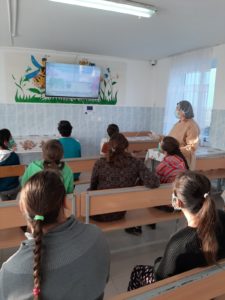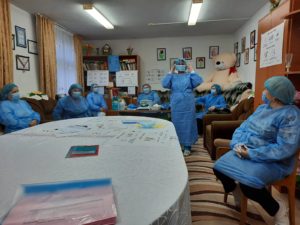 From September 2020 through March 2021, Keystone Moldova has worked to create safe environments with better protection against COVID-19 for people with intellectual and psychosocial disabilities and staff from six residential institutions.
From September 2020 through March 2021, Keystone Moldova has worked to create safe environments with better protection against COVID-19 for people with intellectual and psychosocial disabilities and staff from six residential institutions.
“This project was based on needs and had a comprehensive approach, covering the development of internal safeguarding policies for emergency situations like the COVID-19 pandemic, procurement of protective equipment for residents and staff, and educating people with disabilities and staff on protective measures against COVID-19,” said Ludmila Malcoci, Keystone Moldova Executive Director. “By developing policies and increasing local capacities and awareness, Keystone Moldova ensured the sustainability of these measures.”
Thanks to the European Union’s rapid response and support, 1,700 people with intellectual and psychosocial disabilities and 500 staff received various protective equipment against COVID-19, including masks (33,000 units), gloves (3,000 units), protective goggles (1,400 units), face visors (2,000 units), disinfectant (250 5-liter bottles), disposable gowns (6,000 units), and protective footwear (3,000 units). Additionally, 2,000 people with hearing impairments, including children, received special visor masks so they can communicate while still being protected.

An employee from an institution said, “The donated protective equipment helped us to prevent and control the spread of the virus in our institution. Not so long ago, a person with disabilities contracted the virus, and because we were able to take all preventive measures, we managed to keep everyone else at the institution safe.”
Seventeen staff from residential institutions have become trainers in the safeguarding policy and under Keystone mentorship have trained 450 staff to implement the policy in all six residential institutions. Afterward, staff delivered information to all residents of the institutions. Sixty-two employees increased their knowledge on stress management and preventing burnout syndrome to meet the needs of people with intellectual and psychosocial disabilities during crises.
“People with disabilities are among the hardest hit by the COVID-19 pandemic. This is why the EU decided to support communication campaigns to raise awareness and provide personal protective equipment for people with intellectual and psychosocial disabilities and staff of six residential institutions from the Republic of Moldova. This project confirms once again that social inclusion, safety, and the rights of people with disabilities are a priority for the European Union,” said Mrs. Magdalena Mueller-Uri, Head of Operations for the European Union Delegation in the Republic of Moldova.
To increase access to information, six monitors linked to computers were installed in all six residential institutions. Brochures and videos on preventing COVID-19 were translated into easy-to-read language and broadcasted daily. “In the videos, they say we need to wash our hands, keep distance between people, wear masks… We try to do all these things,” said a person with a disability from one of the institutions. The video equipment was also used to provide distance training for staff and residents.
Forty self-advocates from residential institutions learned how to support their peers to address complaints to the Hotline service and received 40 mobile phones as technical support. “We know that we need to call the Hotline service when our rights are violated. The consultants will help us solve our problems.”
The project “Ensuring safety and human rights of people with intellectual and psychosocial disabilities in six residential institutions during the COVID-19 pandemic” was implemented by Keystone Moldova and funded by the European Union from the EU Rapid Response Mechanism for urgent needs of civil society in the Eastern Partnership.


 From September 2020 through March 2021, Keystone Moldova has worked to create safe environments with better protection against COVID-19 for people with intellectual and psychosocial disabilities and staff from six residential institutions.
From September 2020 through March 2021, Keystone Moldova has worked to create safe environments with better protection against COVID-19 for people with intellectual and psychosocial disabilities and staff from six residential institutions.